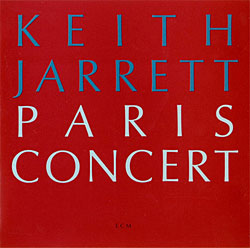| Columns Retired Columns & Blogs |
Recording of November 1990: Paris Concert
KEITH JARRETT: Paris Concert
Keith Jarrett, piano
ECM 1401 (839 173-2, CD only). Peter Laenger, Andreas Newbronner, engs.; Manfred Eicher, prod. DDD. TT: 50:17
Footnote 1: The Well-Tempered Clavier, Book I, reviewed in Vol.11 No.9; and the Goldberg Variations, reviewed in Vol.13 No.4.
Keith Jarrett, piano
ECM 1401 (839 173-2, CD only). Peter Laenger, Andreas Newbronner, engs.; Manfred Eicher, prod. DDD. TT: 50:17
Keith Jarrett's recent emphasis on recording and performing the music of Bach (footnote 1) has left its inevitable traces on his solo improvisations. Never a contrapuntal slouch, Jarrett reaches new heights of grace, allusion, and determined develoment in his new Paris Concert, particularly in the first ten minutes.
 This is Jarrett's most satisfying solo outing since 1982's Concerts (footnote 2). The 38 minutes of "October 17, 1988" (the concert date) passed like 15—I couldn't believe it when my CD player's display ticked over to track 2. As usual with Jarrett, my listening mode flipped back and forth between superficially noting the pianist's influences—Bach, Brahms, Rachmaninoff, minareted muezzins, Otis Spann—and more substantially riding the through-line of which of those musical signposts are revealed as just that—neither road nor destination.
This is Jarrett's most satisfying solo outing since 1982's Concerts (footnote 2). The 38 minutes of "October 17, 1988" (the concert date) passed like 15—I couldn't believe it when my CD player's display ticked over to track 2. As usual with Jarrett, my listening mode flipped back and forth between superficially noting the pianist's influences—Bach, Brahms, Rachmaninoff, minareted muezzins, Otis Spann—and more substantially riding the through-line of which of those musical signposts are revealed as just that—neither road nor destination.
To draw an almost ludicrous analogy: Like the best scripts of the Firesign Theatre, Jarrett's better improvisations defy description. The flights of allusion and reference, arcane and obvious, are far-flung yet seamlessly woven, organically whole. Using completely different tools—wit and words for the one, passion and piano for the other—Firesign and Jarrett create art so internally balanced, so architectonically poised, that one swears one's heard it all before, at the same time feeling the unique thrill of a very first hearing.
Deepest of all, Jarrett's music is a monument to that most basic of human rhythms, breath. Beneath all its flurries of notes, spiraling silences, and Jarrett's trademark ostinato left hand, the long, slow, oceanic breathing of "Oct. 17" gives it an architecture too natural to have been imposed. Under Jarrett's hands the piano becomes noble, tender, orchestral, even monstrous—I leaned forward into the music any number of times, counting hands and fingers.
The two encores are quite different. After a jarringly frenetic intro, Russ Freeman's and Jerry Gladstone's standard, "The Wind," gets an atmospheric, ruminative meditation, while Jarrett's own "Blues" is the straightest, down-homest, most deliberate blues he's ever recorded, the piano vocalizing right along with Jarrett's own mosquito-buzz voice (which, for better or worse, is prominently recorded throughout the entire disc).
The gorgeously deep, lush recording is, of course, closely multi-miked, with perhaps even some added reverb. But producer Manfred Eicher does this sort of thing at least as well as did John Culshaw, and probably better than anyone working today. I have no complaints, even if the piano is 12' wide.
Paris Concert is far superior to last year's solo Dark Intervals, not to mention this year's Changeless. Recommended, as if you didn't know.—Richard Lehnert
Footnote 1: The Well-Tempered Clavier, Book I, reviewed in Vol.11 No.9; and the Goldberg Variations, reviewed in Vol.13 No.4.
Footnote 2: A three-LP set only briefly available complete; the set's first LP only is now available as a CD titled Concerts (ECM 827 286-2).
- Log in or register to post comments



































